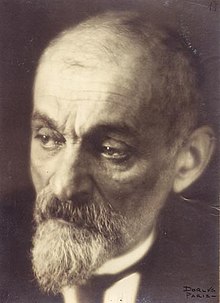
Back ليف شيستوف Arabic ليڤ شيستوڤ ARZ Лев Шестов Bulgarian Lev Xestov Catalan Lev Šestov Czech Leo Isaakowitsch Schestow German Λεφ Σεστόφ Greek Lev Ŝestov Esperanto Lev Shestov Spanish Lev Xestov Basque
Lev Shestov | |
|---|---|
 Shestov in 1927 | |
| Born | Yeguda Lev Shvartsman January 31, 1866[1] |
| Died | November 19, 1938 (aged 72) |
| Era | 19th-century philosophy |
| Region | Russian philosophy Western philosophy |
| School | Christian existentialism |
Main interests | Theology, nihilism |
Notable ideas | Philosophy of despair |
Lev Isaakovich Shestov (Russian: Лев Исаакович Шестов; 31 January [O.S. 13 February][1] 1866 – 19 November 1938; born Yeguda Lev Shvartsman)[a] was a Jewish-Russian existentialist and religious philosopher. He is best known for his critiques of both philosophic rationalism and positivism. His work advocated a movement beyond reason and metaphysics, arguing that these are incapable of conclusively establishing truth about ultimate problems, including the nature of God or existence.[2] Contemporary scholars have associated his work with the label "anti-philosophy."[3][4]
Shestov wrote extensively on philosophers such as Nietzsche and Kierkegaard, as well as Russian writers such as Dostoyevsky, Tolstoy, and Chekhov.[2] His published books include Apotheosis of Groundlessness (1905) and his magnum opus Athens and Jerusalem (1930–37). After emigrating to France in 1921, he befriended and influenced thinkers such as Edmund Husserl, Benjamin Fondane, Rachel Bespaloff,[5] and Georges Bataille. He lived in Paris until his death in 1938.
- ^ a b Martin, Bernard, Introduction to "Athens and Jerusalem"
- ^ a b Sugarman, David (11 June 2012). "A Philosopher of Small Things". Tablet. Retrieved 30 January 2022.
- ^ Weingrad, Michael (2002). "New Encounters with Shestov". The Journal of Jewish Thought and Philosophy. 11 (1): 49–62. doi:10.1080/1053699022000037913.
- ^ Mullarky, John (28 August 2012). "Reviews: Boris Groys, Introduction to Antiphilosophy". Notre Dame Philosophical Review. Retrieved 10 February 2022.
- ^ Christopher E. G. Benfey; Karen Remmler (2006). Artists, Intellectuals, and World War II: The Pontigny Encounters at Mount Holyoke College, 1942-1944. Univ of Massachusetts Press. p. 260. ISBN 1-55849-531-2.
Cite error: There are <ref group=lower-alpha> tags or {{efn}} templates on this page, but the references will not show without a {{reflist|group=lower-alpha}} template or {{notelist}} template (see the help page).